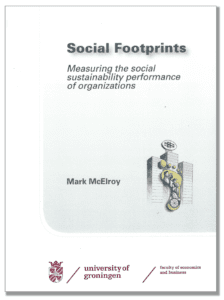Birthplace & Historical Archive of Multicapitalism & Context-Based Accounting
The Social Footprint Method
 The Social Footprint Method (SFM) is a context-based approach for measuring, managing and reporting the social sustainability performance of an organization developed by Mark W. McElroy in 2005-2008. In this regard, the Social Footprint is just a narrow application of Context-Based Sustainability, which in its broader form covers sustainability performance in all of its dimensions: social, economic and environmental.
The Social Footprint Method (SFM) is a context-based approach for measuring, managing and reporting the social sustainability performance of an organization developed by Mark W. McElroy in 2005-2008. In this regard, the Social Footprint is just a narrow application of Context-Based Sustainability, which in its broader form covers sustainability performance in all of its dimensions: social, economic and environmental.
In practice, the SFM is similar to the Ecological Footprint, which is a context-based method for measuring and reporting the ecological sustainability performance of human social systems. Unlike the Ecological Footprint, however, which assesses performance in terms of impacts on natural resources (i.e., natural capital), the SFM assesses performance in terms of impacts on anthropogenic – or what we call “anthro” – capitals (consisting of human, social & relationship, constructed and economic capitals).
The Social Footprint differs from the Ecological Footprint in another very important way. Unlike natural or ecological capital, which is limited in supply and which humans do not produce, anthro capitals are human-made and can therefore be produced as needed, given the will and the resources required to do so. Thus, whereas sustainability in the case of ecological impacts is all about living within our means, sustainability in the case of our social (and economic) impacts is about creating and maintaining the means to live.
Lastly, what mainly differentiates the SFM from other sustainability accounting tools is the manner in which it measures and reports performance relative to organization-specific standards of performance (i.e., for impacts on anthro capitals). Such standards are ultimately determined by reference to what an organization’s duties and obligations are to its stakeholders (as groups) to have, not have, or otherwise manage their impacts on anthro capitals in ways that can affect their well-being. No other sustainability method does this!
Social Footprint Method (book chapter)
The Center for Sustainable Organizations
What differentiates CSO from others in the sustainability arena is its strong commitment to an approach for corporate sustainability measurement, management and reporting that is context-based
